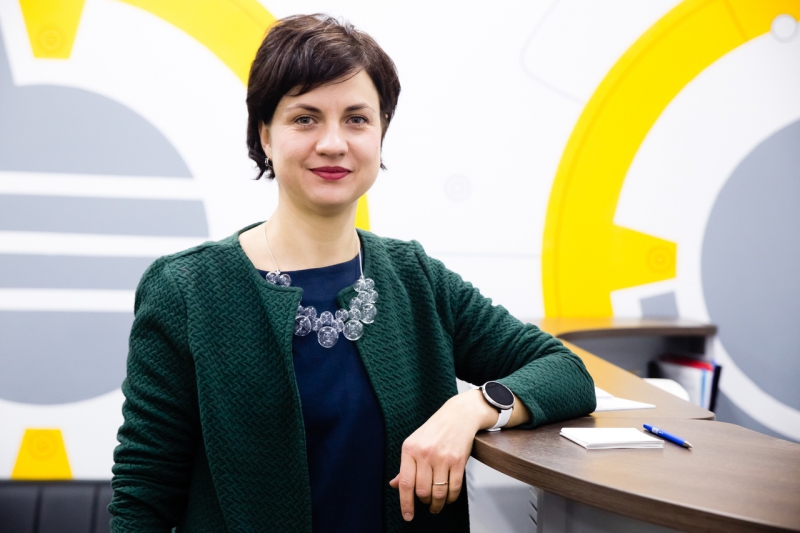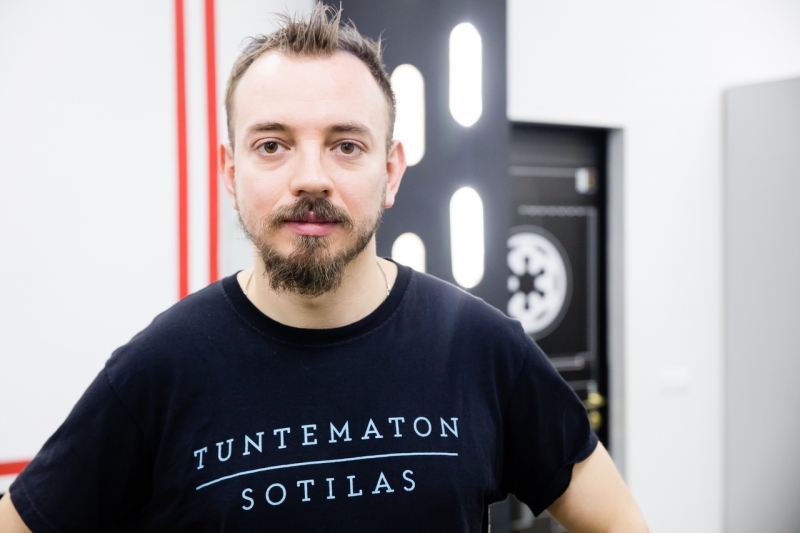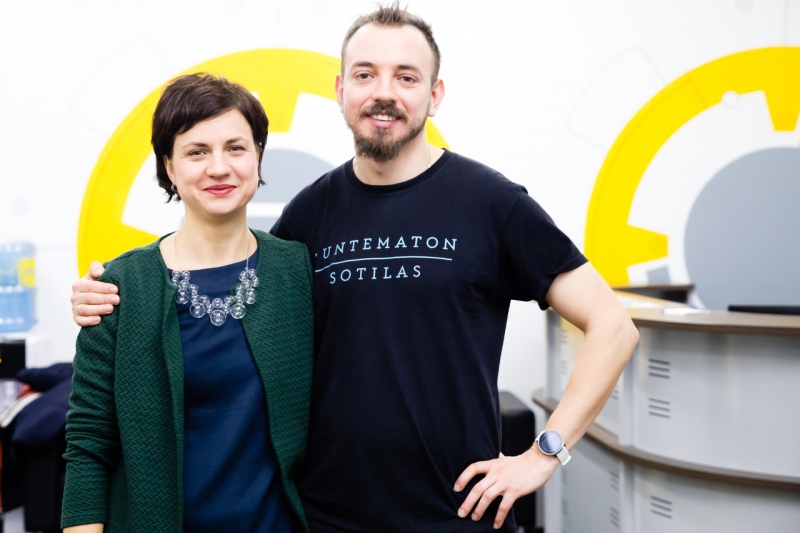Studying and working in St. Petersburg
What was your career path like before your move?
Lev: I started working in the first year of my university studies. That was in a research center where I was paid 60 euros per month. Generally, working there were students like myself and ladies over 50 years old. Our task was to write and support software for airplanes. Students pursued this kind of work to gain experience, while seniors did it because the aviation industry used the software which they’d wrote in the ‘70s and which required them to take care of minor bugs from time to time. For all it’s worth, the place introduced me to a colleague that invited me to work at my first commercial company with a salary of 450-500 euros a month, which was very cool for a first-second-year student.
Zlata, did you also try your hand at science?
Zlata: I did; after graduating I had a short spell of working at a research center which specialized in aircraft design. I remember making drafts by hand, and also that all the coordinators were just about to retire age-wise. I was asking myself back then why the conditions were such that only students and elderly specialists could work there. In any case, I knew that this was just a temporary thing and I needed to continue searching for my path. But it was hard for me to imagine where to move next and in which field to apply my knowledge in fresh out of university. It so happened that I only thought of this in Finland.
Lev, you worked at a startup before leaving for Finland. Why did you not stay there and made the decision to relocate?
Lev: This was in 2008. My colleague founded the startup Cloudmach and found himself an investor. The idea was to transfer 3D technologies to any device, for example, an iPhone. This sounds realistic now, but ten years ago we were revolutionaries. You have to understand that hardware back then wasn’t as powerful as it is today, and you had to impart a lot of effort into transmitting 3D traffic from the server on the client device. Up until a specific moment, our developments were sponsored by Angel Investor, but then the money ran out and I thought this an apposite moment to try to find a job abroad.

So you specifically looked for a job abroad?
Lev: Yes, from as early as in my school years I really wanted to move. Eventually, I started to look for jobs in Europe and America. First I went to Estonia, where I had an interview at Skype; sadly, they didn’t take me on. Then I tried for a job in Prague, but the salary wasn’t satisfactory: I was offered even less than I was earning in St. Petersburg. And then my colleague moved to Finland and invited me to follow suit. I successfully passed the interview and moved there for work.
Zlata, have you also always wanted to move abroad?
Zlata: No, despite the fact that I’m really happy with the move, it was a difficult time for me. While Lev had been dreaming of this from school and prepared himself accordingly, for me the news of us moving to Finland in a month came in as a surprise. I didn’t speak Finnish, I didn’t have a job waiting for me there, and I understood that this was the beginning of a new life for me. The first year there was especially hard: there were no acquaintances, no work, no common language. This was followed by another difficult period during which Russia stopped being my home, and Finland didn’t yet become one. The feeling that I was in my place came later, when I got a better command of the language and culture, found a job and connected with people; life became much easier and more interesting then.
Starting a business
Zlata, what did you do when you just arrived in Finland?
Zlata: I started learning the Finnish language, and then had a baby. I had the time to think of what I wanted to do later on. I had to confirm my Russian diploma in Finland, and then to undergo up to three additional years of training depending on how many subjects I needed to retake. This made me reconsider whether I wanted to stay in the profession or maybe try my hand at a different field. Because anyone could get a second or even third degree regardless of their age, I decided to make use of this opportunity and enrolled for a degree. I chose the field of healthcare with a specialization in working with children and teenagers. After completing my education, I worked in that field for a little bit, then opened my own family kindergarten.

Lev, how did you come to the idea of starting your own business?
Lev: After leaving the company which I moved to Finland to work at, I managed to work at Nokia and F-Secure. And then I realized that I needed to move on and focus on running a business in the field of software development for information security. There are municipal agencies in Finland that help you start your own business. I contacted one of these, explaining that I had a client in the US I would like to work with but that required having my own business ID. They helped me out, explained how to obtain small business owner status, which documents were needed and which taxes and insurance specifics had to be taken care of. After some time I converted my small business owner status to the limited liability company one, as with small businesses all profits are subject to income tax which could amount to 40% if the business volume is big enough. With Ltd., I pay myself a moderate salary and everything else remains on the corporate account which is only taxed 20%.
How difficult was it to launch your own business in Finland?
Zlata: There are paperwork formalities you have to be prepared for. In my case, there were different public committees that evaluated whether I had good enough conditions for working with kids and whether I had good enough education. But on the whole, I can’t say it was especially difficult. Support is available, there are various consulting companies as Lev has already mentioned. As of now, there are four preschool children attending my kindergarten. I act as a teacher and a nanny: I cook food, plan our day, activities and walks.
Do you enjoy it?
Zlata: Yes. Generally, I think that it’s very important to find what you like because when I applied for ITMO as a 17-year old I didn’t give too much thought to my major and how strongly that related to me. In this age, parents’ opinion and societal constructs that some jobs are prestigious and some aren’t tend to play quite an important role in your choice. That’s why I’m happy that although it took me some time, I did succeeded in finding my career path.

Another approach
What makes Finnish education different from the Russian one in your opinion?
Zlata: First and foremost, it’s very practice-oriented. When I did my second degree, I had four months of practice, in other words, a month for each educational module. You learn much more in practice than on lectures just sitting and writing down stuff, plus there is an opportunity of finding a narrower professional focus. It’s the other way round in Russia: there’s lots of theory, lots of tests and lab work, and not enough practice. That’s the reason why graduates leave university not quite knowing where to proceed. And the second difference is lifelong learning. In Finland, I studied both alongside young people who’d barely turned 20 and those who’d retire in a couple of years. And the educational process itself stretches throughout life: I’m still learning and will continue doing so.
Lev: On the topic of practice, I myself am now looking for students to do an internship at our company, I’ve made a visit to the University of Oulu to find out about different terms and conditions. In our field, internships for students should be paid and last from three months. The company I worked at also hired interns. For the most part, businesses don’t get any benefits from this, but this is done out of belief that organizations have social responsibilities. By the way, universities partly compensate for the costs involved, paying 1,600 euros to a company for hiring a three-month internship per student.
Did the education you got at ITMO come in handy?
Zlata: In my case, the answer is no because I ended up changing my profession. But indirectly, my education here did come in handy, as I’d learned to quickly search for information, and understood which education style suits me best. These skills were useful to me as I was getting my second degree.

Lev: Partly yes, but also in the part of gathering and working with information as well as learning skills. One way or another, we’re constantly learning, which makes abilities in this field useful.
What do you like about Finland?
Zlata: In regard to jobs and education, I like the local attitude to different specialists. There’s no such thing here that some professions are good and some are a shame to pursue. Kids are taught that they can be whoever they like, be it a doctor, a cook, a barber, or a lawyer. What you have to judge by is not status or money, but your own career preferences.
Lev: I like that people here don’t brag about their incomes. Here a list is published annually of people who make more than 100,000 euros a year and you can look these people up and how they live. Oftentimes they can’t be distinguished from others: they don’t have expensive gadgets, cars or accessories. It’s not customary to show these things off here, and I think that it creates healthy attitudes to work and money.
Is knowing the Finnish language essential for living in Finland?
Lev: It passed me by in my first year here because English is enough for working at an IT company.

Zlata: In fact, English may well be enough for living in Finland in general. All the staff speaks English here. It was important for us to learn the language because we wanted to become Finnish citizens and understand our child who goes to a Finnish kindergarten. But I know people who get by with only English.
Lev: Yes, you won’t get lost with English here. On the other hand, you won’t feel part of the society, but this is a question of priorities.
What advice would you give to current ITMO students?
Zlata: Firstly, to listen to yourself when choosing a career path. You have to stick to the field you truly like and enjoy working in. Secondly, to learn English, because knowledge of languages certainly expands opportunities available. Thirdly, you have to be hardworking. Happiness won’t descend from a cloud and won’t come with your diploma: you have to make an effort, not be afraid of making mistakes and always move forward.
Lev: I agree that you learning languages is a must, English above all else. And you also have to think about your future, because university is not an end goal but a means to fulfilling your potential in life.





